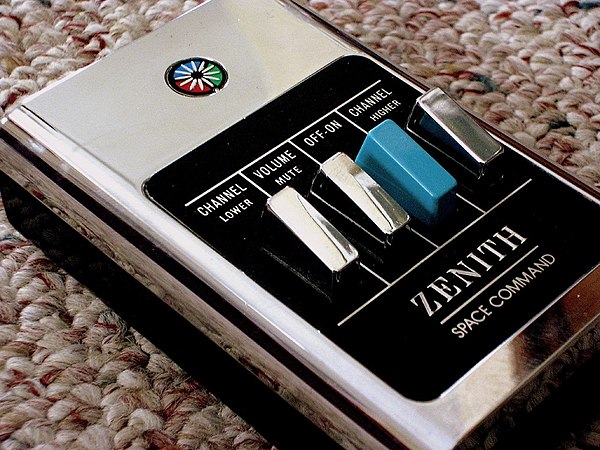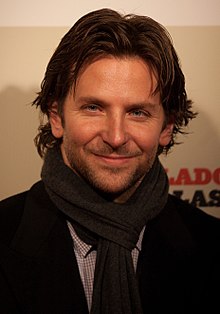Portal:Television
The Television Portal

Television (TV) is a telecommunication medium for transmitting moving images and sound. Additionally, the term can refer to a physical television set, rather than the medium of transmission. Television is a mass medium for advertising, entertainment, news, and sports. The medium is capable of more than "radio broadcasting", which refers to an audio signal sent to radio receivers.
Television became available in crude experimental forms in the 1920s, but only after several years of further development was the new technology marketed to consumers. After World War II, an improved form of black-and-white television broadcasting became popular in the United Kingdom and the United States, and television sets became commonplace in homes, businesses, and institutions. During the 1950s, television was the primary medium for influencing public opinion. In the mid-1960s, color broadcasting was introduced in the U.S. and most other developed countries.
In 2013, 79% of the world's households owned a television set. The replacement of earlier cathode-ray tube (CRT) screen displays with compact, energy-efficient, flat-panel alternative technologies such as LCDs (both fluorescent-backlit and LED), OLED displays, and plasma displays was a hardware revolution that began with computer monitors in the late 1990s. Most television sets sold in the 2000s were flat-panel, mainly LEDs. Major manufacturers announced the discontinuation of CRT, Digital Light Processing (DLP), plasma, and even fluorescent-backlit LCDs by the mid-2010s. LEDs are being gradually replaced by OLEDs. Also, major manufacturers have started increasingly producing smart TVs in the mid-2010s. Smart TVs with integrated Internet and Web 2.0 functions became the dominant form of television by the late 2010s. (Full article...)
Selected article -
"Favorite Son" is an episode of the American science fiction television series Star Trek: Voyager. First broadcast on UPN on March 19, 1997, it was the 20th episode of the third season. Lisa Klink wrote and Marvin V. Rush directed the episode. Set in the 24th century, the show follows the adventures of the crew of the starship USS Voyager after they are stranded in the Delta Quadrant, far from the rest of the Federation.
In the episode, Ensign Harry Kim (Garrett Wang) experiences déjà vu and develops a rash when the Voyager enters a new sector of the Delta Quadrant. Mostly female aliens known as Taresians tell him that he is not human but is a member of their species. On discovering this is a ruse by the female aliens to attract and kill their men during reproduction, the crew rescues Kim and restores him to his original state. Deborah May and Kristanna Loken play two of the Taresians, Patrick Fabian portrays a man tricked by them and Irene Tsu appears as Kim's mother.
Selected image -

A remote control is an electronic device used for the remote operation of a machine. The term remote control can be also referred to as "remote" or "controller" when abbreviated. It is known by many other names as well, such as the "clicker", "channel-changer", "splat", "magic hand", etc. Commonly, remote controls are used to issue commands from a distance to televisions or other consumer electronics such as stereo systems and DVD players.
Did you know (auto-generated) -

- ... that an episode of the children's TV show Arthur featuring a same-sex wedding was not aired on Alabama's PBS network?
- ... that Svalbard Minute by Minute, a 221-hour-long television broadcast, is credited with increasing tourism in Svalbard by 25 percent?
- ... that John Seigenthaler hosted a literary interview program which ran for 42 years on Nashville Public Television?
- ... that a federal marshal seized a car and a truck because there was no other way to satisfy a debt owed by Arkansas television station KRZB-TV?
- ... that Colorado public television station KTSC operates from two studios named for the same benefactor?
- ... that the theme song for Guilty's live-action television series is Toshi's first original song in 22 years?
Selected quote -
More did you know
- ...that the book South Park and Philosophy: You Know, I Learned Something Today analyzes the animated television comedy series South Park using philosophical concepts?
- ...that Anne Montgomery, who has been a sportscaster for several local television stations as well as SportsCenter, was the first female football referee in Arizona?
- ...that an advertising spot immediately following Xinwen Lianbo, a daily news programme shown by most terrestrial television stations in mainland China, can sell for an estimated US$100,000?
- ...that the final episode of the 1986 television series Outlaws recycled footage from The Oregon Trail, because actors Rod Taylor and Charles Napier appeared in both programs?
- ...that Ralph "Petey" Greene overcame a drug addiction and prison sentence to become an Emmy Award-winning radio and television talk show host and a guest at the White House?
Selected biography -
Daniel Irvin Rather Jr. (/ˈræðər/; born October 31, 1931) is an American journalist, commentator, and former national evening news anchor. He began his career in Texas, becoming a national name after his reporting saved thousands of lives during Hurricane Carla in September 1961. Rather spontaneously created the first radar weather report by overlaying a transparent map over a radar image of Hurricane Carla. In his first national broadcast, he helped initiate the successful evacuation of 350,000 people. He reported on some of the most significant events of the modern age, such as the fall of the Berlin Wall, the Gulf War, 9/11, the Iraq War, and the war on terror.
Rather also famously reported from Dallas in November 1963 at the time that President John F. Kennedy was assassinated. Based on such reporting, he was promoted at CBS News, where he served as White House correspondent beginning in 1964. He served as foreign correspondent in London and Vietnam over the next two years before returning to the White House correspondent position. He covered the presidency of Richard Nixon, including Nixon's trip to China, the Watergate scandal, and the president's resignation. (Full article...)General images
News
- December 28: US professional wrestler Jon Huber dies aged 41
- September 2: Tributes paid to recently deceased US actor Chadwick Boseman
- May 24: Japanese professional wrestler and Netflix star Hana Kimura dies aged 22
- January 16: BBC newsreader Alagiah to undergo treatment for bowel cancer
- Upcoming events
Featured content
Main topics
History of television: Early television stations • Geographical usage of television • Golden Age of Television • List of experimental television stations • List of years in television • Mechanical television • Social aspects of television • Television systems before 1940 • Timeline of the introduction of television in countries • Timeline of the introduction of color television in countries
Inventors and pioneers: John Logie Baird • Alan Blumlein • Walter Bruch • Alan Archibald Campbell-Swinton • Allen B. DuMont • Philo Taylor Farnsworth • Charles Francis Jenkins • Boris Grabovsky • Paul Gottlieb Nipkow • Constantin Perskyi • Boris Rosing • David Sarnoff • Kálmán Tihanyi • Vladimir Zworykin
Technology: Comparison of display technology • Digital television • Liquid crystal display television • Large-screen television technology • Technology of television
Terms: Broadcast television systems • Composite monitor • HDTV • Liquid crystal display television • PAL • Picture-in-picture • Pay-per-view • Plasma display • NICAM • NTSC • SECAM
Categories
WikiProjects

|
You are invited to participate in WikiProject Television, a WikiProject dedicated to developing and improving articles about Television. |
- Main projects
- Sub-projects
Television Stations • American animation • American television • Australian television • British TV • BBC • Canadian TV shows • Television Game Shows • ITC Entertainment Productions • Digimon • Buffyverse • Doctor Who • Degrassi • EastEnders • Episode coverage • Firefly • Futurama • Grey's Anatomy • Indian television • Lost • Nickelodeon • The O.C. • Professional Wrestling • Reality TV • The Simpsons • Seinfeld • South Park • Stargate • Star Trek • Star Wars • Soap operas • Avatar: The Last Airbender • House
- Related projects
Animation • Anime and manga • Comedy • Comics • Fictional characters • Film • Media franchises
What are WikiProjects?
Things you can do

- Place the {{WikiProject Television}} project banner on the talk pages of all articles within the scope of the project.
- Write: Possible Possum
- Cleanup: color television, Alien Nation: Body and Soul, The Sopranos, Alien Nation: Dark Horizon, Alien Nation: The Enemy Within, Alien Nation: Millennium, Aang
- Expand: Timeline of the introduction of color television in countries
- Stubs: Flow (television), Just for Kicks (TV series), Play of the Month, Nova (Dutch TV series), More stubs...
Subportals
Related portals
Associated Wikimedia
The following Wikimedia Foundation sister projects provide more on this subject:
-
Commons
Free media repository -
Wikibooks
Free textbooks and manuals -
Wikidata
Free knowledge base -
Wikinews
Free-content news -
Wikiquote
Collection of quotations -
Wikisource
Free-content library -
Wikiversity
Free learning tools -
Wiktionary
Dictionary and thesaurus
































































